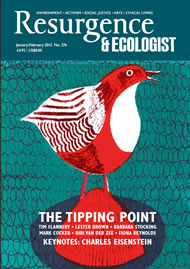Half a century has now passed since Satish’s walk from India to the USA via Moscow, Paris and London – and since the publication of Rachael Carson’s seminal book, Silent Spring. It is also 46 years since the publication of the first issue of Resurgence, so our magazine – not of course by coincidence – is more or less the same age as the green movement itself.
In his review of the last 50 years of the green movement, The Independent’s Michael McCarthy concluded that despite its many successes, and despite the hugely increased awareness of the issues that has been achieved, one major change is still largely lacking, and that is an emotional and spiritual shift towards feeling, sensing and knowing fundamentally that as humans we are entirely part of and dependent upon Nature.
Of course he is right. Because even when we know this on an intellectual level, we don’t always sense it fully.
This key concept is the centre ground of Resurgence – it is our reason for existing – and as we move into a New Year we have this exciting opportunity of bringing that missing ‘ingredient’ to the centre of the debate and of making a truly critical contribution to the next stage in the development of the green movement.
Resurgence magazine started life as a part of the anti-nuclear campaign and so fitted perfectly with Satish’s remarkable Peace Walk and with the campaigning of Bertrand Russell, who had first inspired him to action. Russell himself, it is worth reflecting, was partly brought up by his grandfather, Lord John Russell, who had been one of the principal architects of The Great Reform Act of 1832. Thus the roots of Resurgence, in that ‘activism’ sense, go much further back than we might think.
Activism, yes. But the golden thread that runs throughout both Resurgence’s history and Satish’s editorship is nonviolence, and this gives us another, far older, historical link through Satish himself to the ancient roots of the Jain religion more than two millennia ago and, more recently, to his own teacher Vinoba, himself a pupil of Gandhi, and also, of course, to Martin Luther King, whom Satish also met on his Peace Walk.
In the sixties, at the time of that walk, it was becoming apparent to many that peace between nations would only be a possibility if we could all learn to live at peace with the Earth. They saw too that peace with Nature means that human activities must be on a small scale: a human scale, not a mega-industrial scale; that we must learn to use far less fossil fuels and that we must see and treat Nature as irreplaceable – as infinitely precious capital and not as revenue to be spent, squandered and stolen from future generations.
Since then, the contributors to Resurgence have included all of the greatest thinkers, writers and activists in the green movement: James Lovelock, Jonathon Porritt, Wendell Berry, Amory Lovins, Fritjof Capra, Caroline Lucas, Vandana Shiva and many more.
In particular I should mention John Moat, who is, after Satish himself, the magazine’s senior contributor, with over 100 articles over 100 issues to his name. He is also co-founder of the prestigious Arvon Foundation, which promotes the teaching of creative writing and was also inspired by its patron Ted Hughes.
And so reflecting on all this brings me seamlessly to the unique combination of art, spirituality, Nature, ecology and social justice that makes Resurgence (now Resurgence & Ecologist) so special. It means our magazine and our members of The Resurgence Trust perfectly placed to influence fundamental thinking about our place in Nature and, indeed, about the true meaning of a good and purposeful life – ideas that will be crucial if we are ever to move beyond the futile and narrow politics of searching for endless economic growth.
It is also a combination that has borne fruit in the numerous initiatives that have sprung from Resurgence and its readers, such as the Small School in Devon, Schumacher College, Green Books, our annual Resurgence Summer Camp, the Schumacher lectures and about 20 lively readers’ groups around the world.
The most significant of recent developments, of course, has been our recent merger with the Ecologist, which has brought together the two wings of the UK’s green movement, so they can now fly together. We have also, over the last year, strengthened our links with Friends of the Earth and with Oxfam, in whose bookshops it is now possible to join The Resurgence Trust.
So, after 40-something years, Resurgence continues to flourish, even though so much more remains to be done. In a world that is so full of nonsense – and much worse than nonsense – Resurgence points consistently towards a way of life that embodies peace, beauty and justice; and so, as we set off into 2013, we do so in the knowledge that whatever the challenges ahead, we also have a great deal to celebrate.
This article is adapted from the author’s presentation at the Resurgence Festival of Wellbeing, 2012. You can watch the footage from the event online www.policyreview.tv/live/840/421







